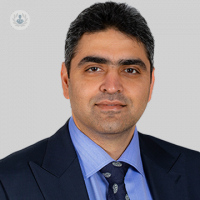How is shoulder instability diagnosed?
Written by:In this article here, Mr Abhinav Gulihar, an esteemed consultant orthopaedic surgeon, details how shoulder dislocations occur, and how they are typically treated.

What is a shoulder dislocation?
A shoulder dislocation occurs when the ball of the upper arm bone called the humerus pops out of the ball and socket shoulder joint. The socket of the shoulder is very shallow, and while this makes it one of the most flexible joints in the body, it also makes it prone to dislocations.
Why does the shoulder dislocate?
A shoulder dislocation usually occurs after a significant injury. It is more common in young active people and often occurs during contact sports such as football or rugby. In older patients, the shoulder can dislocate even after a simple fall.
Shoulder dislocations can sometimes occur even without an injury in some people with loose joints or those with muscle imbalance.
Can the shoulder dislocate again?
A first-time dislocation of the shoulder often causes damage to the cartilage called labrum that is usually attached to the edges of the socket of the shoulder joint. There is also sometimes damage to the bones in the shoulder. This can be in the form of a dent at the back of the ball of the shoulder or sometimes as a small fracture of the socket.
These injuries can make the shoulder prone to further dislocations even without significant injury. With recurrent dislocations, the shoulder can become more unstable and can sometimes easily dislocate just by reaching out or turning over in bed.
Who is more at risk of further dislocations?
Further dislocations are more common in young men under the age of 25. The risk of further dislocations is lower in women and decreases with increasing age. Competitive contact athletes and those with significant bony damage are also at risk.
How is shoulder instability diagnosed?
A clear history of a dislocation after a sporting injury is very important in the clinical assessment. Some people experience episodes of partial dislocations with occasional feeling of a dead arm during certain movements or contact sports. Clinical examination may show signs that the shoulder is at risk of dislocation during certain movements.
X-rays are very useful as they can accurately assess the direction of the dislocation (towards the front or back) and to look for damage to the ball or the socket of the joint. An MRI scan helps to assess the damage to the labrum, although a special MRI with injection of a contrast/dye is more accurate. If there is a suspicion of significant bony damage, a CT scan is also requested.
How is shoulder instability treated?
Traumatic shoulder dislocations frequently require a visit to the emergency department for a reduction of the shoulder. Once the shoulder is back in the joint, the arm is placed in a sling for a few weeks.
Non-operative treatment is usually recommended in people with a first-time dislocation. A supervised physiotherapy regime is often successful in treating symptoms of instability. Surgery may be appropriate in those with multiple dislocations and sometimes in those who have had a single dislocation but are at a high risk of recurrence. Those who continue to have apprehension during certain movements or are unable to continue exercise/ sports can also choose to have surgery.
The operation performed depends on the degree of damage to the bones and ligaments in the shoulder. This can be either a keyhole procedure aimed at repairing the ligament or cartilage injury or an open operation to increase the size of the socket by transferring a bone to the front of the socket.
To book an appointment with Mr Abhinav Gulihar, you can visit his Top Doctors profile today.


